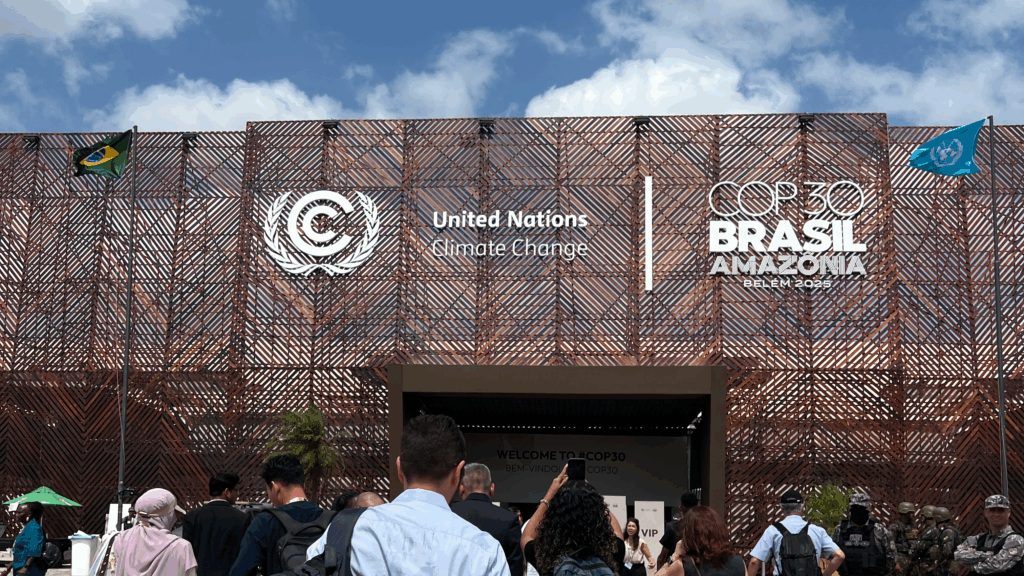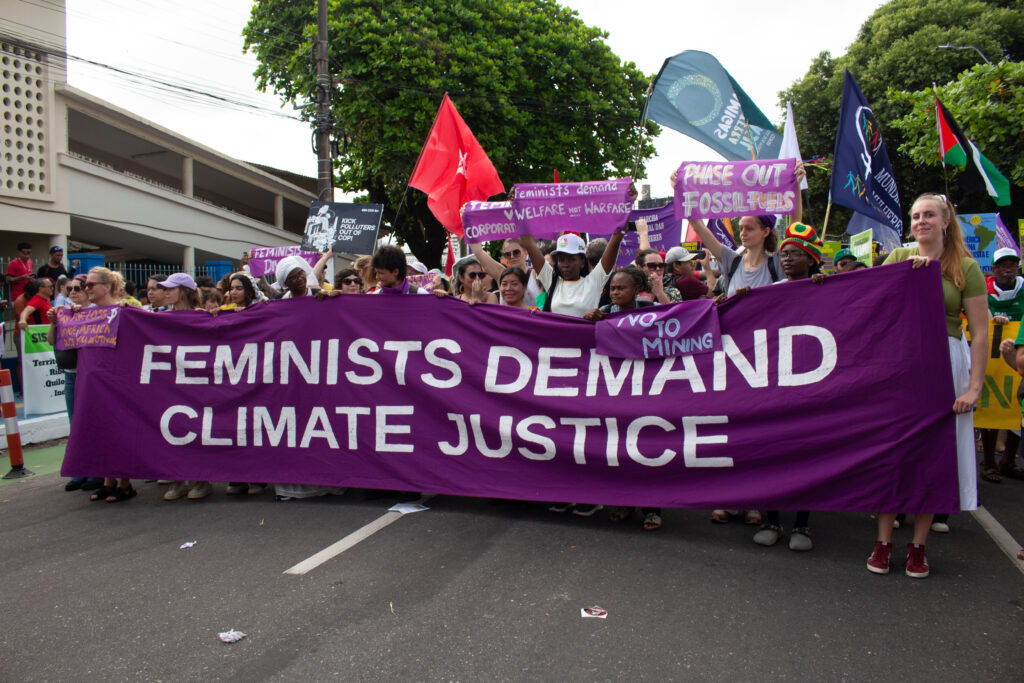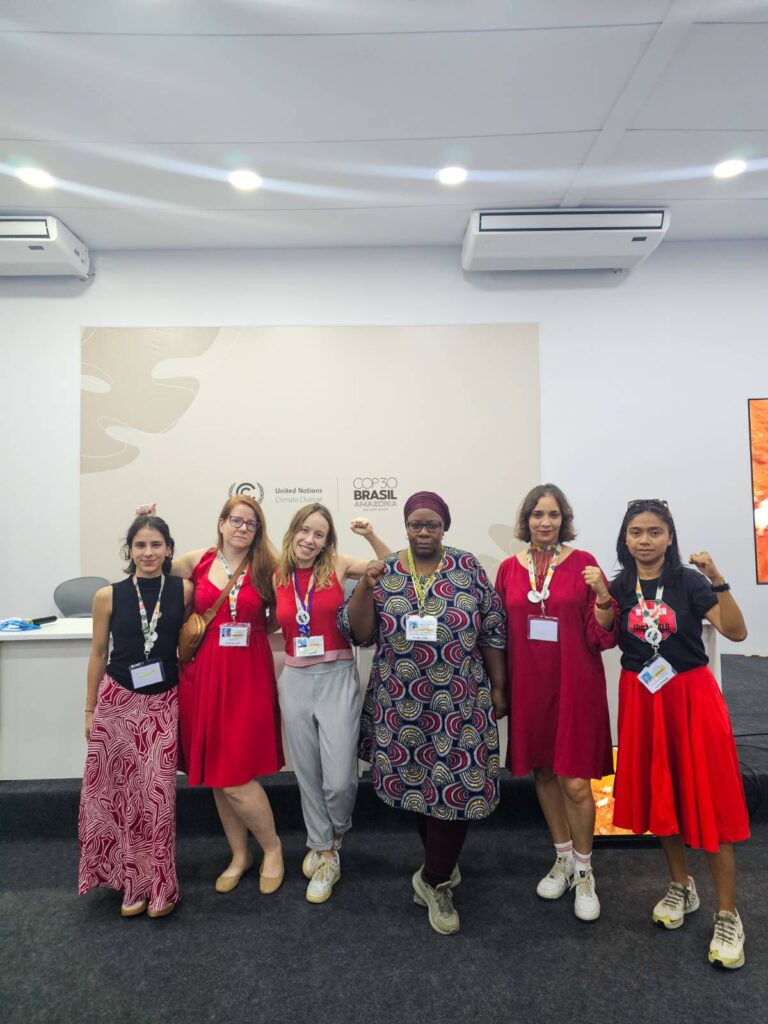
Highlighting Concerns on Eve of UN Climate Summit

On the eve of the upcoming UN Summit on Climate Change, commencing next week at UN Headquarters in New York, the Women and Gender Constituency to the UNFCCC, one of the 9 formal constituencies to the UNFCCC, recirculates a letter highlighting a number of basic concerns and recommendations about the organization and thematic focus of this event. This letter was sent to the UN Secretary General several months ago, on February 25th, with regrettably no formal response from the SG’s office. The concerns however remain the same, and below we highlight the key points from this letter:
- The Summit MUST use caution to avoid the casual promotion of public-private partnerships to catalyze action on climate. We call for full transparency on all corporate contributions to the UN and its specialized agencies, including through public-private partnerships. We also call for rigorous adherence to the numerous normative rights frameworks and legally binding agreements in the field of sustainable development, which provide the foundation for the work of the United Nations.
- The Summit MUST to move beyond top-down “business as usual” initiatives, instead prioritizing community-driven, bottom-up initiatives that contribute to genuinely sustainable energy production, transport solutions and ecosystem conservation and restoration that challenges the development models that triggered the climate crisis in the first place. Moreover, it should be ensured any initiative highlighted at the Summit includes strong social, environmental and gender-sensitive safeguards, and is in line with the human rights framework.
- If the Summit is truly working to catalyze action in the UNFCCC process, it must ensure work is in line with the principles of the Convention, it should remind Governments of their present legal commitments to reduce emissions (addressing the gap between now and projected implementation in 2020); and should call all countries to work towards a fair and legally binding agreement with sufficiently ambitious quantified GHG emission reductions taking into account the principle of common but differentiated responsibilities in 2015.
READ the full letter below and DOWNLOAD here.
—————————————————–
From: Members of the Women and Gender Constituency – Official NGO Observer Constituency to the UNFCCC
To the Organizers of the Secretary General’s 2014 Climate Summit,
Thank you for this invitation to share commitments to the Secretary General’s upcoming Climate Summit, which in the words of the Secretary General himself, challenges Heads of State and Government along with business, finance, civil society and local leaders to join with “bold pledges to innovate, scale-up, cooperate and deliver concrete action that will close the emissions gap and put us on track for an ambitious legal agreement through the UNFCCC process.”
We welcome the opportunity to highlight several progressive climate change solutions, drawn out of a network of practitioners, leaders and activists in numerous countries. These actions take into account bottom-up approaches, of proven small-scale initiatives that also benefit people and communities, respect rights, reduce current and future emissions and achieve sustainable development. Please see attached for a short list of projects. With more time and resources to complete a wider scoping across our multiple collective networks, much more could be shared. For example, further projects on solar water heaters, decentralized community energy grids, community-led agroforestry, ecosystem based adaptation, and sustainable consumption pledges- some which were highlighted during the 2012 Rio Earth Summit through the Women’s Major Group ‘Good Practice Awards’. We will continue to encourage networks to highlight these actions.
As the Women and Gender Constituency, while we believe it is crucial to highlight positive sustainable solutions, many groups and networks have expressed concerns for the framing and transparency of the Secretary General’s Climate Summit, which we would like to outline here and hope will facilitate further progressive dialogue.
Increasing influence of corporations on UN priorities
Many groups have expressed increasing concerns regarding the rise in corporations’ unprecedented levels of access to the United Nations and state-level decision-making processes[1]. Recent reports[2] have highlighted a disturbing re-orientation of development towards the interests and priorities of the private sector- a trend evident at the recent UN climate negotiations in Warsaw, which resulted in a ‘walk-out’[3] of hundreds of civil society groups, trade unions, women & youth in particular. Just this week, 80 civil society organizations sent a letter[4] to board members of the Green Climate Fund, alarmed at the growing influence of corporations in this space. This increasing trend of prioritizing and championing public-private partnerships and the ‘transformative’ role of the private sector in ensuring sustainable development often obscures the fact that private companies are not obligated to invest in social needs and global public good, nor does it take into account the ways in which the private sector, especially large trans-national corporations, have contributed to establishing the unsustainable development model which drives catastrophic climate change. Regulation, and accountability and transparency of non-state actors, particularly trans-national corporations and public-private partnerships, are critical for achieving sustainable development.[5] Therefore, we urge the Summit organizers to use caution to avoid the casual promotion of public-private partnerships to catalyze action on climate. We call for full transparency on all corporate contributions to the UN and its specialized agencies, including through public-private partnerships. We also call for rigorous adherence to the numerous normative rights frameworks and legally binding agreements in the field of sustainable development, which provide the foundation for the work of the United Nations.[6] We hope the Climate Summit will focus on effective policies to comply with these agreements, including the UNFCCC itself, and galvanize the political will needed to agree upon the ambitious legally binding GHG reduction commitments needed for a successful outcome of the climate negotiations in 2015.
Scale of Commitments
The Summit organizers have shared that showcased stakeholder initiatives (of which 10 or so will be chosen) should contribute to new, substantive, scalable and/or replicable actions that reduce emissions; incentivize action towards a low-carbon economy; address economic risks or advance economic opportunities; or strengthen resilience, preferably with tangible results to showcase by September 2014. In highlighting only a small amount of stakeholder projects, there is concern that emphasis will be placed on large scale “high mitigation potential” initiatives that are mainly driven by partnerships through trans-national corporations, large international NGOs and foundations to the detriment of a diverse array of local, right-based, community driven and replicable initiatives which are more likely to challenge current development patterns that caused the climate crisis. The Women and Gender Constituency therefore urges the organizers to move beyond top-down “business as usual” initiatives, instead prioritizing community-driven, bottom-up initiatives that contribute to genuinely sustainable energy production, transport solutions and ecosystem conservation and restoration that challenges the development models that triggered the climate crisis in the first place. Moreover, it should be ensured any initiative highlighted at the Summit includes strong social, environmental and gender-sensitive safeguards, and is in line with the human rights framework.
Impact on UNFCCC Climate Negotiations
Finally, in addition to showcasing solutions the Summit is intended to “put us on track for an ambitious legal agreement through the UNFCCC process.” Though there is no official negotiated document as an output of the Summit, many networks are concerned that the structure of the Summit – of ‘pledging’ commitments – will work to re-enforce and strengthen the growing reluctance to take on quantified legally binding commitments in the UNFCCC process, eschewing the legal commitment already enshrined in the Convention to reduce GHG emissions to a safe level, and ensuring a path of continued unsustainable growth. At COP19 in Warsaw, we saw countries backtracking on emissions targets rather than raising them, furthering the gap between the reductions which science tells us is needed, and what countries are willing to commit to. If the Summit is truly working to catalyze action in the UNFCCC process, it must ensure work is in line with the principles of the Convention, it should remind Governments of their present legal commitments to reduce emissions (addressing the gap between now and projected implementation in 2020); and should call all countries to work towards a fair and legally binding agreement with sufficiently ambitious quantified GHG emission reductions taking into account the principle of common but differentiated responsibilities in 2015.
In closing, we reiterate our appreciation for this invitation to dialogue with the Summit organizers and look forward to greater transparency in the way forward on preparations for the Climate Summit in terms of framing, criteria, selection of initiatives, timeline and milestones, Government commitments, and participation. The members and networks of the Women and Gender Constituency remain committed to urgent, ambitious, just, gender-responsive and legally binding action on climate change.
Kindest Regards,
Members of the Women and Gender Constituency to the UNFCCC
[1] (Sept., 2013) Women’s Major Group. “Strengthening Gender Justice: Recommendations for the SDGs and the Post-2015 Development Agenda.”
[2] (January 2014) Working paper by GPF, Brot für die Welt and MISEREOR, written by Lou Pingeot, “Corporate influence in the Post-2015 process”
[3] (November 2013) by Katie Valentine at thinkprogress.org Hundreds Stage A Walkout At The U.N. Climate Talks In Warsaw: “Enough Is Enough”
[4] (February 2014) CSO Letter to Members and Alternate Members of Green Climate Fund Board
[5] (February 2014) Gender, Economic, Social and Ecological Justice for Sustainable Development: A Feminist Declaration for Post 2015
[6] International Covenant on Civil and Political Rights (ICCPR), International Covenant on Economic, Social and Cultural Rights (ICESCR), International Covenant on the Rights of the Child (CRC), Convention on the Elimination of All Forms of Racial Discrimination (CERD), CEDAW and International Labour Organization (ILO) Conventions

